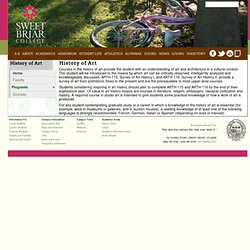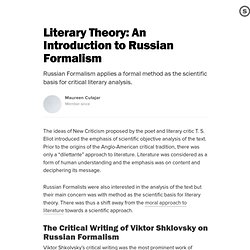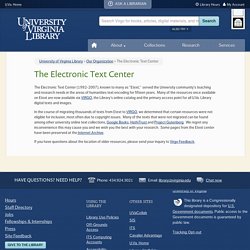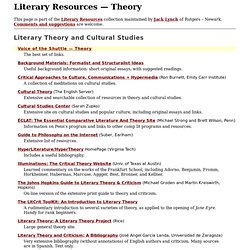

Literary Criticism. Literary Theorists. What is Art? What is an Artist? INTRODUCTION. Courses in the history of art provide the student with an understanding of art and architecture in a cultural context.

The student will be introduced to the means by which art can be critically observed, intelligently analyzed and knowledgeably discussed. ARTH 115, Survey of Art History I, and ARTH 116, Survey of Art History II, provide a survey of art from prehistoric times to the present and are the prerequisites to most upper level courses. Students considering majoring in art history should plan to complete ARTH 115 and ARTH 116 by the end of their sophomore year. Of value to art history majors are courses in literature, religion, philosophy, classical civilization and history. A required course in studio art is intended to give students some practical knowledge of how a work of art is produced. Literary Theory: An Introduction to Russian Formalism. The ideas of New Criticism proposed by the poet and literary critic T.

S. Eliot introduced the emphasis of scientific objective analysis of the text. Prior to the origins of the Anglo-American critical tradition, there was only a “dilettante” approach to literature. Literature was considered as a form of human understanding and the emphasis was on content and deciphering its message. Russian Formalists were also interested in the analysis of the text but their main concern was with method as the scientific basis for literary theory. The Critical Writing of Viktor Shklovsky on Russian Formalism Viktor Shkolvsky’s critical writing was the most prominent work of Russian Formalism. The Concept of Shklovsky’s Defamiliarization Shklovsky states that the perception of human beings becomes automized through the demands of everyday life.
The purpose of art is to change our mood of perception from the automatic to the artistic. Literature Laying Bare Its Own Devices Artifice Constructs Reality. Etext Center: Collections. University of Virginia Library > Our Organization > The Electronic Text Center The Electronic Text Center (1992-2007), known to many as “Etext,” served the University community’s teaching and research needs in the areas of humanities text encoding for fifteen years.

Many of the resources once available on Etext are now available via VIRGO, the Library’s online catalog and the primary access point for all U.Va. Library digital texts and images. In the course of migrating thousands of texts from Etext to VIRGO, we determined that certain resources were not eligible for inclusion, most often due to copyright issues. Literary Resources. This page is part of the Literary Resources collection maintained by Jack Lynch of Rutgers – Newark.

Comments and suggestions are welcome. Literary Theory and Cultural Studies Voice of the Shuttle — Theory The best set of links. Background Materials: Formalist and Structuralist Ideas Useful background information: short original essays, with suggested readings. Critical Approaches to Culture, Communications + Hypermedia (Ron Burnett, Emily Carr Institute) A collection of meditations on cultural studies. Cultural Theory (The English Server) Extensive and searchable collection of resources in theory and cultural studies. Cultural Studies Center (Sarah Zupko) Extensive site on cultural studies and popular culture, including original essays and links. ÉCLAT: The Essential Comparative Literature And Theory Site (Michael Strong and Brett Wilson, Penn) Information on Penn's program and links to other comp lit programs and resources.
Guide to Philosophy on the Internet (Suber, Earlham) Miscellaneous links.